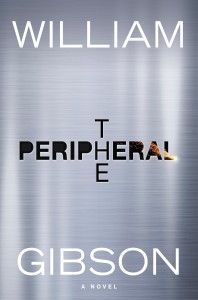 Once again, a William Gibson book seems ripped from today’s headlines, extrapolated forward a bare few years. I like The Peripheral as much as I’ve liked any of Gibson’s books. Probably better. It takes place in a very real-seeming world, among real-seeming people.
Once again, a William Gibson book seems ripped from today’s headlines, extrapolated forward a bare few years. I like The Peripheral as much as I’ve liked any of Gibson’s books. Probably better. It takes place in a very real-seeming world, among real-seeming people.
The central characters are Flynne (her first name), an unemployed young woman in a small town in a nameless Southern U.S. state a bare few years from now; and Netherton (first name Wilf), a young publicist (a.k.a., bullshit artist) in London of a few decades hence. Say, seven decades. Their worlds are more different than the timespan would indicate.
As with any Gibson book, we’re plunged right into these characters’ worlds, headfirst into the action, with minimal background, and have to figure out what’s going on bit by bit. The sometimes Vonnegutian abbreviated chapters and the characters’ clipped speech patterns threaten to make it feel removed, distant, bloodless, but the solid reality of Flynne and her milieu keep the story and reader grounded.
The plot? Without giving away too much, Flynne is substituting for her older brother, an ex-Marine, as a player in a bizarre immersion video game when she witnesses what appears to be a crime. This “game” starts drawing her further into itself, and she starts wondering whether it’s really a game when things start happening to her in real life. Things that seem to be influenced by the game. The game, of course, is where Netherton lives, and he too is involved as a witness in yet another apparent crime.
But as with most of Gibson’s worlds, the interesting things are the details. What’s happening on the periphery of the story, as it were. At its base The Peripheral revolves around climate change, but it’s not “about” that. It’s just the baseline fact in these characters’ lives.
The story doesn’t work if we don’t care about the characters, Flynne in particular. And we do come to care about her, because she’s just human enough; we like her because she makes good moral choices, but we can identify with her because she’s capable of making mistakes. But this is not a novel of character but of action and idea. The idea Gibson is playing with here is: given climate change, what then? Do we descend straight back to a Dark Ages, or do our somewhat more advanced technology and political systems offer us something of a buffer? Those headlines I mentioned that the story sometimes seems ripped from? Politically, Gibson is taking a goodly portion of his clues from recent post-Soviet Russian history. What happens when our political and economic systems fail to keep up with reality? Technologically … well, as I was reading this book I heard this story on PRI’s “The World” about something known as the Maker Movement, who are in some ways a driving force behind what we are still quaintly referring to as 3D printing. And The New Yorker carried this article about the rise of professional “cyber athletes,” which in a way is what Flynne and her brother are.
I was tickled to see Gibson give an acknowledgement to Patterson Hood of the Drive-By Truckers, whose song title “Buttholeville” was used as an epithet for Flynne’s little town. But I was a little puzzled at no mention of Robert A. Heinlein, whose later stories seem at least indirect antecedents of The Peripheral. I’m thinking particularly of the way some unknown force seems to be meddling in this world’s history, the tidy way Gibson wraps up a number of relationships in the denouement, and especially of the struldbruggian age of some of the characters. I hope you’ll read the book to see if you agree.
(Putnam, 2014)
